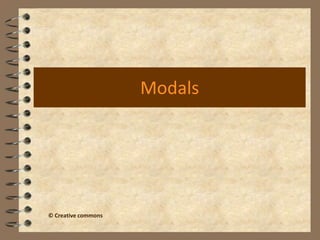
Modals Lecture
- 1. Modals © Creative commons
- 3. Could
- 4. May
- 5. Might
- 6. Must
- 7. Shall
- 8. Should
- 9. Will
- 10. Would
- 11. OughttoThey are Auxiliaryverbs that provide additional and specific meaning to the main verb of the sentence Modal verbs are sometimes referred to as ModalAuxiliaryverbs because they help other verbs
- 12. How do we use modals? Example: Marycouldplaythe piano S Subject V Verb M They do not accept conjugation They do not need other auxiliary verbs © Creative commons
- 13. Form He can ski He cans ski or He can skis Wouldyou like to come with me? Do you would like to come with me? They can’t be serious They don’t can be serious There is no “s” in singular There is no “do / does” in the question There is no “don’t / doesn’t” in the negative © Creative commons
- 14. Form to can / caning to must /musting She must study We should have gone the other way He couldplayfootball in hisyouth (general ability) Modal verbs do not have infinitives or –ing forms Modal verbs are followed by an infinitive withoutto
- 15. Form Modal verbs do not have all the tenses Modal verbs use other verbs to complete the tenses Can is completed with be able to Mustis completed withhave to They can play the piano You must come early They will be able to play the piano in the future You had to come early yesterday
- 16. What do they express? Theycan have different meanings depending on the situations they are used To understand it better we are going to divide them into 3categories Single Concept Modal: they have one meaning Double Concept Modal: they have two meanings Modals in past: They are used to express a situation in the past
- 17. Categories
- 22. Modals in the Past They are modals referred to actions that happened in the past Itmust have beena difficult decision They should have invited her to their wedding MODAL + HAVE + verb in past participle
- 23. Modals in Past : Modal + have + past participle
- 24. A last tip There are few verbs which often serve as modals too. These are modal-like verbs They need to be conjugated